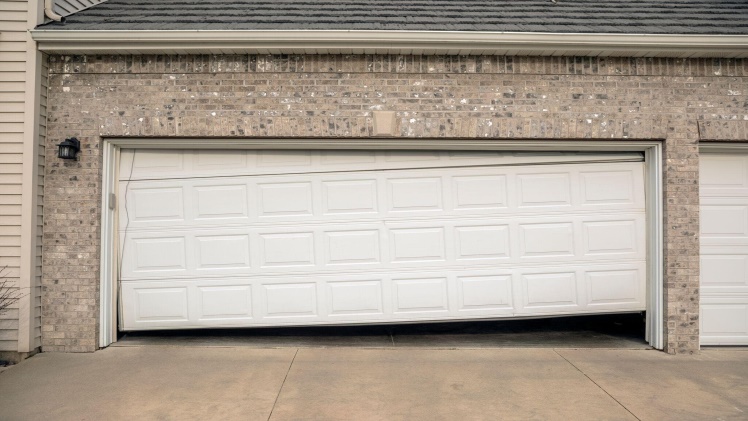Garage doors are essential to our homes, providing security and convenience. However, like any mechanical system, they can develop problems over time due to wear and tear, weather conditions, or other factors. Understanding common garage door problems is crucial for homeowners to ensure their garage doors’ continued functionality and safety. We will discuss some of the most common garage door problems and their potential causes.
Some of the most common garage door problems
Noisy Operation
One of homeowners’ most frequent complaints about their garage doors is excessive noise during operation. A noisy garage door can be annoying, disturb neighbors, and may indicate underlying issues. The noise source can often be traced to several factors, including loose hardware, worn-out rollers, or insufficient lubrication. Loose nuts and bolts can create rattling sounds, while worn rollers or hinges can cause squeaking. Regular maintenance, such as tightening hardware and lubricating moving parts, can help alleviate noisy operations.
Slow or Jerky Movement
Garage doors should operate smoothly and at a consistent speed. If you notice your garage door moving slowly or jerking during operation, it may be a sign of an issue with the garage door opener or the door’s balance. The garage door opener’s motor may struggle due to worn-out components or improper adjustment. An unbalanced door can also strain the opener, causing it to work harder than necessary. To resolve these issues, consult a professional technician to inspect and adjust the opener and ensure the door is properly balanced.
Stuck or Jammed Garage Door
A garage door that gets stuck or jams when opening or closing is inconvenient and a safety concern. There are several potential reasons for a stuck garage door, including obstructions in the door’s tracks, damaged rollers, or problems with the garage door opener. Inspect the tracks for debris or objects blocking the door’s movement. If the rollers are damaged or worn, they may need replacement. Additionally, issues with the garage door opener, such as a faulty motor or misaligned sensors, can cause the door to get stuck.
Uneven Closing or Opening
A garage door opening or closing unevenly can be a sign of a balance issue. An unevenly balanced door puts extra strain on the opener, leading to premature wear on components. You may notice one side of the door rising faster than the other or the door sagging in the middle. Loose cables, damaged springs, or misaligned tracks often cause this problem. Addressing these issues promptly is essential to prevent further damage to the door and opener.
Sagging or Warping Garage Door
Over time, garage doors can sag or warp, leading to alignment problems and difficulties in opening and closing. This issue is more common with wooden garage doors, as wood is susceptible to moisture and temperature fluctuations. Sagging or warping can also occur due to inadequate support or damage to the door’s structural components. Replacing damaged panels and reinforcing the door’s structure can help resolve this problem. Regular maintenance and a protective finish to wooden doors can also prevent warping.
Broken Springs
The garage door’s springs play a crucial role in its operation by counterbalancing its weight and assisting in opening and closing. However, springs are subjected to significant stress and can break over time. A broken spring is a serious issue, as it can cause the door to become extremely heavy and difficult to lift manually. Replacing a broken spring with the proper knowledge and tools can be safe. It’s essential to contact a professional technician to replace broken springs safely.
Remote Control Malfunctions
Garage door remote controls provide convenience by allowing you to open and close the door inside your vehicle. If your remote control is not working correctly, it can be frustrating and may indicate a few potential problems. First, check the batteries in the remote to ensure they are not depleted. If the batteries are fine, there may be interference issues or a problem with the remote’s programming. Resetting and reprogramming the remote control to the garage door opener often resolve this problem. If the issue persists, consult the manufacturer’s instructions or a professional technician.
Weather Seal Damage
The weather seal on your garage door is essential for keeping out moisture, pests, and drafts. Over time, weather seals can become damaged or deteriorate, leading to leaks and reduced insulation. Inspect the seal around your garage door for wear, cracks, or gaps. If you detect any damage, substitute the weather seal to ensure your garage remains properly sealed and insulated. This not only helps protect your belongings but also improves energy efficiency.
Comprehending common garage door problems is essential for homeowners to maintain the functionality and safety of their garage doors. While some issues can be resolved through simple maintenance tasks and adjustments, others may require professional intervention. Regular inspections and proactive maintenance, such as 24/7 garage door repairs in Surrey, can help identify problems early and stem costly repairs in the future. Remember that garage door safety should be a top priority, and a qualified technician should address any issues you cannot address on your own to ensure the continued security and convenience of your garage.

